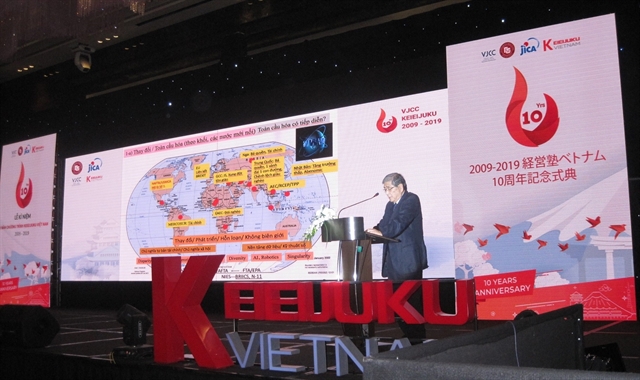 Economy
Economy


|
| Keieijuku lecturer Chosaku Toda, who is also former CEO of Panasonic in Europe and the US, says that one of the weaknesses of Vietnamese enterprises was long-term strategy. — Photos of JICA |
HÀ NỘI — Some 400 entrepreneurs across the country gathered in Hà Nội on November 15 to celebrate the 10th anniversary of the Keieijuku Business Course.
Keieijuku is a course provided for managers of Vietnamese enterprises. It is organised by the Việt Nam-Japan Institute for Human Resouces Development (VJCC) and supported by the Japan International Co-operation Agency.
The 10-month course focus on providing participants with the opportunity to learn and acquire practical knowledge and tools for business administration. Learners can also create links with Japanese enterprises during and after their time in Japan. The knowledge they got from the programme is expected to help enterprises renovate and improve their business and production efficiency, gradually reaching Japanese standards.
According to Toshiyuki Nakamura, Director General of JICA's Department of Industrial Development and Public Policy, Keieijuku is a training programme to draw content related to corporate governance.
During a training course there would be different sessions with different intensive content. At the end of the programme, students would visit Japan to see management practices as well as current issues for Japanese businesses, he said.
Since the programme was first launched in 2009, some 600 learners have taken part in Keieijuku courses, forming a business community which Japanese enterprises are interested in when seeking partners, especially in the supporting industry. They now manage enterprises with more than 52,000 employees and generate total revenue of more than VNĐ100 trillion (US$4.4 billion) each year.
After training courses in Việt Nam, Keieijuku lecturer Chosaku Toda pointed out one of the weaknesses of Vietnamese enterprises was long-term strategy. He said for Japanese people, the most important point in business was the mindset of the manager always follows the business philosophy, through specific questions 'What was the business born for?' and set a clear vision.
“This is the basis for generations of management in the business to operate and continue the goal,” he said.
According to Toda, also former CEO of Panasonic in Europe and the US, Keieijuku is a Japanese-style business management programme which covers a wide range of aspects, from business philosophy, personnel, business strategy and production management.
“Such contents can be shared with Vietnamese businesses because Japan has undergone the process of business development for the past 60 - 70 years so the problems that Japanese businesses encountered in the early days are very similar to the reality that small and medium enterprises in Việt Nam are facing,” he said.

|
| Participants of Keieijuku courses have MoUs of co-operation at the ceremony. |
Doctor Bùi Anh Tuấn, President of the Hà Nội-based Foreign Trade University (FTU), said the Keieijuku course was an important part of co-operation between FTU and JICA. It had proved to be the most successful co-operation project, he said.
He said one of the interesting points of the training course is that each enterprise can be taken as a case study.
“Through the programme, Vietnamese entrepreneurs have got modern business philosophy from Japan and can apply into their business,” Tuấn said, adding that most of participants had positively changed their enterprises to Japanese style thinking were the customer comes first and human resources are valued.
“The biggest change to mention is in their mindset in business, production organisation, long-term vision and mission.”
According to Tuấn, the programme’s success also comes from the connection among enterprises after the training courses finish.
“Not only within the Keieijuku community, the enterprises also can connect to enterprises outside the community, especially Japanese ones,” he said. — VNS